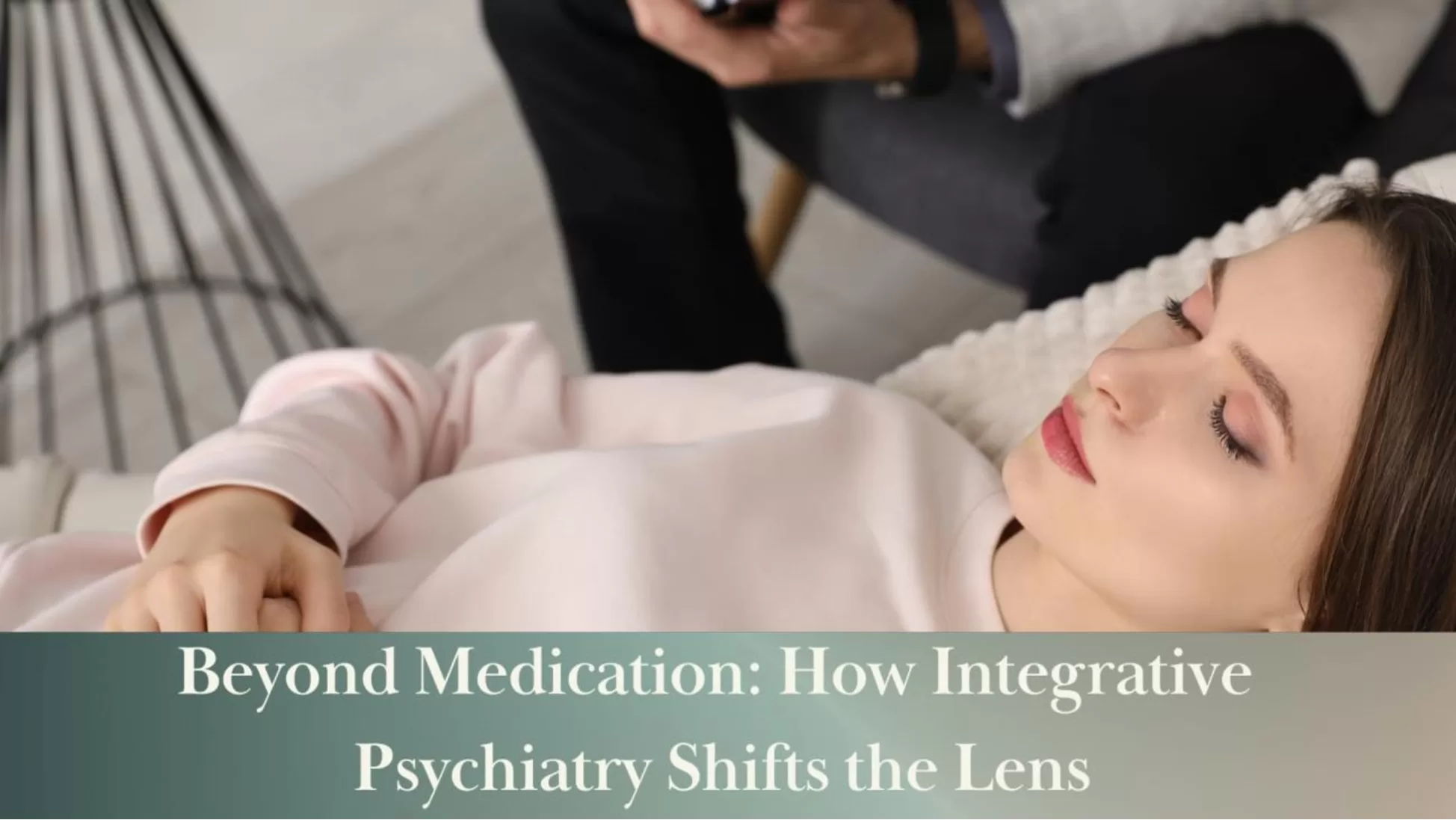Integrative Psychiatry vs. Conventional Psychiatry: 5 Key Differences for Patients

Mental health care is evolving fast. While conventional psychiatry has long focused on diagnosis and medication, integrative psychiatry brings a broader, whole person lens that blends conventional science with evidence based holistic therapies. If you or a loved one is weighing options, understanding how these two models diverge can make all the difference in your healing journey. Below, we unpack five critical differences every patient should know, then help you decide which approach fits your needs.
What Is Conventional Psychiatry?
Core Principles
Traditional psychiatry is rooted in a subjection, interview based model. Practitioners:
● Identify mental disorders through standardized criteria through interview (e.g., DSM-5).
● Target neurochemical imbalances with FDA approved medications.
● Emphasize symptom reduction and crisis stabilization.
Typical Treatment Modalities
1. Prescription medication management (antidepressants, mood stabilizers,
antipsychotics).
2. Brief supportive psychotherapy or referral to outside therapists.
3. Occasional lab work to monitor drug side effects.
This approach can be life saving, especially for severe conditions, but many patients still struggle with residual symptoms or medication intolerance. This model can be lifesaving in relief. However, long-term treatment often result in high relapse rates, with patients frequently requiring additional or stronger medications over time. While conventional psychiatry can be helpful in the short run, many individuals continue to struggle with persistent symptoms, side effects, or medication dependence in the long term.
What Is Integrative Psychiatry?

Core Principles of Integrative Psychiatry
Integrative psychiatry builds upon the interview-based model of conventional psychiatry but expands it by incorporating objective testing to uncover underlying contributors to mental health symptoms. Rather than relying solely on subjective reports, this approach integrates data from lab work, qEEG, and other assessments to inform care.
Its guiding principles include:
Whole-person perspective: Mental health cannot be separated from physical health, lifestyle,
and environment.
Root-cause focus: Objective testing helps identify imbalances or dysfunctions—such as
nutritional deficiencies, inflammation, gut-brain dysregulation, or mitochondrial issues—before
turning to prescriptions.
Collaborative care: Patients and clinicians co-create treatment plans that empower the
individual.
Comprehensive toolkit: Therapeutic strategies support both body and mind, drawing from
functional medicine, nutrition, lifestyle medicine, and practices that foster new neural pathways,
such as neurofeedback, mindfulness, and other mind-body modalities.
This integrative framework does not reject medication but positions it as one tool among many,
aiming to restore balance, resilience, and long-term healing.
Holistic Treatment Modalities
An integrative psychiatrist may recommend:
● Targeted nutrition and gut-brain optimization.
● Evidence-based supplements, herbs, or amino acids.
● Advanced lab testing, genetic panels, and brain mapping.
● Neurofeedback, biofeedback, and mindfulness training.
● Novel therapies such as ketamine-assisted therapy or legal psilocybin-assisted therapy.
● Conventional medications, used strategically and often at lower doses.
By blending therapies, integrative psychiatry aims for sustainable, whole-person transformation.
5 Key Differences Between Integrative and Traditional
Psychiatry
1. Treatment Philosophy: Symptom Management vs. Root Cause Healing
● Traditional psychiatry often targets symptom clusters with medication.
● Integrative psychiatry digs deeper and looks wider looking at inflammation, hormones, micronutrient status, trauma history, and lifestyle triggers. The goal is long term relief through root cause resolution.
2. Therapeutic Toolbox: Medication Only vs. Multimodal Care
● Conventional care leans heavily on pharmaceuticals with optional talk therapy.
● Integrative clinicians combine medications (when needed) with nutrition counseling, brain mapping, functional medicine lab analysis, neurofeedback, exercise prescriptions, and emerging psychedelics—giving patients a larger toolkit for healing.
3. Patient Involvement: Passive Recipient vs. Collaborative Partnership
● In traditional models, the doctor decides and the patient follows.
● Integrative psychiatry emphasizes shared decision making. You’ll review lab data, explore lifestyle factors, and co-design changes—boosting motivation and adherence.
4. Assessment Methods: Standard Interview vs. Whole Body Testing
● A standard psychiatric interview and rating scales guide most conventional diagnoses.
● Integrative psychiatry augments the conversation with comprehensive blood panels, microbiome testing, brain wave analysis, epigenetic markers, and stress hormone mapping. The result is a panoramic view of your biological and psychological landscape.
5. Outcome Focus: Short Term Stability vs. Sustainable Well Being
● Traditional success often equals “symptoms under control.”
● Integrative psychiatry defines success as thriving—optimal mood, cognition, sleep,energy, and meaning. Follow up care includes relapse prevention coaching and integration support after therapeutic experiences such as ketamine or psilocybin sessions.
Which Approach Is Right for You?
Choosing between integrative psychiatry and traditional psychiatry isn’t an either or decision think of it as a spectrum. Ask yourself:
● Have medications alone provided incomplete relief?
● Has your treatment for mental health only consisted an interview with no lab work?
● Do you suspect nutrition, gut health, or chronic inflammation play a role?
● Are you interested in cutting-edge therapies such as ketamine-assisted therapy,
neurofeedback, or psilocybin-assisted therapy?
● Do you want a collaborative relationship with clinicians who factor in your lifestyle,
values, and spiritual goals?
If you answered yes to any of these, an integrative psychiatry practice may offer the comprehensive care you’re seeking.
Frequently Asked Questions
Does integrative psychiatry replace medication?
No. Medications remain valuable tools, particularly for acute stabilization. Integrative
psychiatrists may prescribe but also explore ways to minimize side effects and complement
drugs with non medications therapies and lifestyle interventions.
Is integrative psychiatry evidence based?
Absolutely. Nutritional psychiatry, functional medicine testing, and psychedelic-assisted
therapies are grounded in a growing body of peer-reviewed research. Reputable clinics rely on
science and track outcomes rigorously.
What conditions respond well to integrative care?
Depression, anxiety, PTSD, ADHD, bipolar disorder, traumatic brain injuries, and even autism spectrum disorders often improve when treated with a whole person strategy that addresses inflammation, nutrient deficiencies, and nervous-system dysregulation.
Traditional psychiatry has helped millions, yet its medication centric model may fall short for those seeking deeper healing. Integrative psychiatry widens the lens- treating mind, body, and spirit with customized protocols that can restore resilience and unlock lasting well being.
Ready to explore your next step? Schedule a comprehensive integrative psychiatry consultation with The Wholeness Center- where board certified psychiatrists, naturopathic doctors, and expert therapists unite science and compassion to guide you toward wholeness.

Leave a Reply